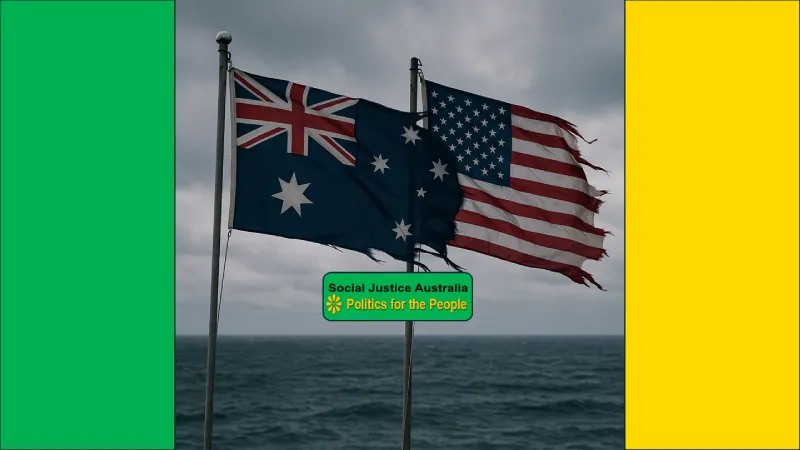Description
Why the US Australia alliance needs a rethink. The U.S. is no ally. Discover why Australia must distance itself to avoid war and reclaim its sovereignty.
How Australia Can Safely Distance Itself from U.S. Hegemony
Introduction – The US Australia Alliance: Myth vs Reality
Picture this: You’re sitting in a Brisbane café, sipping a flat white while reading the headlines—Australia has just signed another defence pact with the United States. More American troops, military hardware, and diplomatic praise about our “unbreakable alliance.” Yet, beneath the headlines lies a growing discomfort—are we allies, or are we just a strategic pawn in U.S. global dominance?
Joh Bjelke-Petersen once said that this is just politicians “feeding the chooks.” Empty words. The truth is, the U.S. government doesn’t respect its people, let alone Australia. It sees nations—including its own—as resources to be mined for profit. This article will explore how Australia can break free from this exploitative alliance without putting itself in harm’s way.
The U.S. Government’s Track Record: A Global Power Without Respect
Exploiting Its Own Citizens
Visit Detroit, Michigan—a city once bustling with manufacturing pride. Now, it stands as a ghost town of forgotten promises, where basic water access has become a luxury. Millions of Americans are homeless or working two jobs or more just to survive. U.S. billionaires soared in wealth, while 45 million Americans live impoverished.
Internal reflection: “If they treat their own citizens this way, what hope do allies have?”
Exploiting Other Nations
Let’s take Iraq. The 2003 invasion, sold on lies about weapons of mass destruction, cost hundreds of thousands of lives, all to secure oil. In Libya, a once-stable nation descended into chaos after U.S.-led intervention. This is not defence—it’s corporate imperialism.
When the U.S. backs coups in Latin America or imposes sanctions on countries like Venezuela or Cuba, the motive is always clear: control the global economy for U.S. corporate gain.
The U.S.–Australia Relationship: Not What It Seems
Political Rhetoric vs Reality
 Australian and U.S. politicians often repeat phrases like “shared values” and “strong friendship.” But how many Australians were consulted when Pine Gap was set up or when AUKUS was signed?
Australian and U.S. politicians often repeat phrases like “shared values” and “strong friendship.” But how many Australians were consulted when Pine Gap was set up or when AUKUS was signed?
Dialogue: “This isn’t a partnership. It’s a surrender of our sovereignty,” says a former Australian diplomat.
The Cost of Loyalty
Australia’s blind support for U.S. policy has real consequences:
• Trade tensions with China—our largest trading partner
• Environmental destruction from military exercises on Australian soil
• Loss of independence as U.S. bases expand here without public debate.
Why China Matters More Than Ever
China as Australia’s Major Trading Partner
60% of Australia’s exports go to Asia, with China alone accounting for over 25%. Australia’s economy is tightly linked to Chinese demand, from iron ore to wine. Trade disruptions—often driven by political antagonism encouraged by the U.S.—have already cost farmers, winemakers, and miners dearly.
The Danger of Choosing Sides
We risk becoming collateral damage in a U.S.-China conflict. Australia should not repeat its mistakes from Vietnam or Iraq—wars that had nothing to do with our national interest but cost us dearly in blood, treasure, and reputation. This has been the outcome of the US Australia alliance.
Thought: “Must we always fight other nations’ wars? When do we stand up for ourselves?”
Pathways Toward Australian Independence
Embracing Dollar Sovereignty
Australia issues its own currency and cannot run out of money—it is a monetary sovereign. We do not need to rely on foreign powers for funding. Public money should serve Australians, not fund U.S. war machines.
Case Study: Japan funds 90% of its government debt domestically. So can we.
Diversifying Foreign Policy and Alliances
 We can:
We can:
• Strengthen ties with ASEAN neighbours.
• Rejoin the Non-Aligned Movement spirit.
• Reinvest in UN peacekeeping and international diplomacy.
Phasing Out US Australia Alliance and Military Influence
Start with transparency:
• Conduct a national audit of U.S. bases and agreements.
• Establish parliamentary oversight.
• Hold a public referendum on AUKUS.
Dialogue: “Our security must not come at the cost of our sovereignty,” says Senator David Shoebridge.
Navigating Risks Without Provocation
Public Messaging and Soft Diplomacy
We can reshape the narrative. Use diplomatic language that focuses on peace, sovereignty, and cooperation. Frame our actions as neutral—not anti-American but pro-Australia.
Lessons from Non-Aligned Nations
Switzerland stayed neutral in both world wars. Finland, pre-NATO, managed a careful balance between Western cooperation and Russian deterrence. ASEAN nations often quietly assert their sovereignty without provoking superpowers.
Australia can learn from them.
It’s Time to Put Australia First
Australia must stop blindly following the U.S. We’ve been used in wars of aggression, economically punished for siding with U.S. interests, and kept in the dark about military decisions made on our soil. It’s time for foreign policy independence that aligns with the will and welfare of the Australian people.
We can choose a future where diplomacy, trade, and sovereignty come before alliance loyalty.
Q&A Section
Q: Can Australia survive without the U.S. alliance?
A: Yes. Australia has regional allies, economic resilience, and dollar sovereignty. Our safety lies in neutrality and diplomacy, not dependency.
Q: Would distancing ourselves lead to economic loss?
A: No. Strengthening trade ties with Asia and other emerging economies offsets any impact.
Q: How do we avoid war with China without relying on the U.S.?
A: Assert diplomatic neutrality, reinvest in foreign diplomacy, and stop participating in U.S.-led provocations.
Question for Readers
Do you believe Australia should assert an independent foreign policy? What do you think it would take for our government to break free from U.S. dominance?
Leave your thoughts below.
Call to Action
If you found this article insightful, explore more on political reform and Australia’s monetary sovereignty at Social Justice Australia: https://socialjusticeaustralia.com.au/
Share this article with your community to help drive the conversation toward a more just and equal society.
Click on our “Reader Feedback”. Please let us know how our content has inspired you. Submit your testimonial and help shape the conversation today!
Support Social Justice Australia – Help Keep This Platform Running
Social Justice Australia is committed to delivering independent, in-depth analysis of critical issues affecting Australians. Unlike corporate-backed media, we rely on our readers to sustain this platform.
If you find value in our content, consider making a small donation to help cover the costs of hosting, maintenance, and continued research. No matter how small, every contribution makes a real difference in keeping this site accessible and ad-free.
💡 Your support helps:
• ✅ Keep this website running without corporate influence
• ✅ Fund research and publishing of articles that challenge the status quo
• ✅ Expand awareness of policies that affect everyday Australians
💰 A one-time or monthly donation ensures Social Justice Australia stays a strong, independent voice.
🔗 Donate Now
Thank you for being part of this movement for change. Your support is truly appreciated!


We dont HAVE to be China’s “slave”, to establish trading or other relationships with China. As long as they don’t expect to have any of their war bases on our soil. And we STOP allowing them to buy up all the and and mines and business in Australia – HANDS OFF, they’re OURS!
But we do need to stop playing the sycophant to an untrustworthy America. Get to hell out of that crazy AUKUS agreement, and get submarines some other way. Join with European and other nations to rebuild a new, stronger, international trading group
Hi Richard,
Thanks for your comment—you’ve raised some strong and important points.
You’re right: Australia doesn’t need to be submissive to any global power, whether the U.S. or China. We can and should trade on mutually respectful terms, without allowing foreign ownership of strategic assets or military influence on our soil.
And yes, the AUKUS agreement is a dangerous commitment that risks pulling Australia into another unnecessary war, likely one not of our making. There’s growing support for rethinking that agreement and exploring independent defence and trade strategies.
Forming new alliances with neutral or like-minded nations—especially in Europe, Asia, and the Global South—could help Australia chart a sovereign path that puts our people, land, and future first.
As for China’s investment in Australia and setting up military bases. China is far from the top investor in Australia: https://www.dfat.gov.au/trade/trade-and-investment-data-information-and-publications/foreign-investment-statistics/statistics-on-who-invests-in-australia. Also, China has only one overseas military base in South Africa. The U.S. has over 700 around the world, many surrounding China.
Would you support Australia holding a public referendum on AUKUS and foreign military presence?
Yes I would. More people are thinking the same since Trump is in, but I think it is too early many are only just starting to look at politics. It might lose at this stage.
Hi Kerry,
Thanks for your thoughtful comment—you’re absolutely right.
Many Australians are just beginning to critically examine politics and foreign policy, especially in light of global events like Trump’s rise. It takes time for public awareness to grow and mature into action.
That said, early discussions like this are essential. They help plant the seeds of political consciousness; over time, they can shift public opinion in powerful ways. Even if we’re not “there” yet, raising these issues ensures we’re ready when more Australians start asking the hard questions.
Change rarely happens overnight—but it begins with conversations just like this one.
Would you support a national forum or citizen assembly to explore Australia’s foreign policy future?